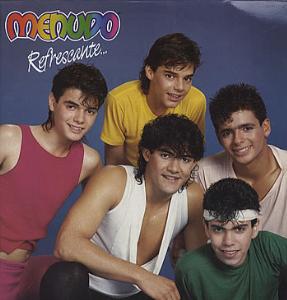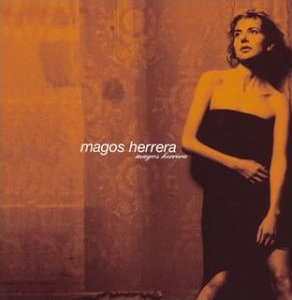
Refrescante is Menudo's 21st studio album released in 1986, featuring Charlie Massó, Robby Rosa, Ricky Martin, Raymond Acevedo, and Sergio Blass. These are the second and third albums this line-up recorded together This also the first time the group recorded songs made by Brazilian composers, the single "Diga Sim" was written by Ed Willson and Carlos Colla, the song "Alegria" by Michael Sullivan and Paulo Massadas and "Cara ou Coroa" which version was made by Carlos Costa. In Brazil, the Portuguese version of the album was titled "Menudo", and was released 25 June 1986.

RBD is a Mexican Latin pop group that gained popularity from Televisa's telenovela Rebelde (2004–2006). It was composed of Anahí, Dulce María, Maite Perroni, Alfonso Herrera, Christopher von Uckermann and Christian Chávez. The group achieved international success from 2004 until their separation in 2009 and sold over 15 million records worldwide, making them one of the best-selling Latin music artists of all time.

Zé Ramalho is a Brazilian composer and performer. Zé Ramalho has collaborated with various major Brazilian musicians, including Vanusa, Geraldo Azevedo and Alceu Valença.

The 7th Annual Latin Grammy Awards were held for the first time in New York City, NY. The awards show was held at Madison Square Garden on Thursday, November 2, 2006. Shakira was the big winner winning Album of the Year, one of four awards that she won. She is the first female artist to win Record of the Year, Album of the Year, and Song of the Year.

Televisão (Television) is the second studio album by Brazilian rock band Titãs, released in 1985 via WEA. It is the first album to feature drummer Charles Gavin, following André Jung's departure in the previous year.
Romantico Desde Siempre Volume 1 and 2, are a compilation of romantic songs from the first albums by Mexican singer Luis Miguel. The Volume 1 was released on November 29, 1994, and the Volume 2 on 1997, both by EMI Latin. The first volume peaked at No. 26 on the Top Latin Albums chart.

Luis Miguel: 20 Años is a VHS Video from the Mexican singer Luis Miguel. It was recorded in 1991 during the presentations of the artist with the Gira 20 Años by various places in Mexico after the release of his last album 20 Años.

Magos Herrera is a Mexican jazz singer, songwriter, producer, and educator. She sings in English, Spanish, and Portuguese, and has collaborated with Javier Limón, saxophonist Tim Ries, Aaron Goldberg, Pedro Aznar, Ed Simon Trio, John Patitucci, Luis Perdomo, Adam Rogers, Tim Hagans, Alex Kautz, composer Paola Prestini, former Kronos Quartet cellist Jeff Zeigler, and many others.

Orquideas Susurrantes, is the second studio album by the Latin jazz Mexican singer Magos Herrera.

Pais Maravilla, is the third studio album by the Latin jazz Mexican singer Magos Herrera.

"Todo Puede Inspirar" is the fourth studio album by the Mexican Latin Jazz singer Magos Herrera.

Magos Herrera is a Japanese compilation album, by the Latin jazz Mexican singer, Magos Herrera. Released on April 21, 2004 in Japan, the album included songs from her previous albums, Orquideas Susurrantes and Pais Maravilla.
New Mexico – Mi Lindo Nuevo México is a song written and composed by Pablo Mares, which was adopted as the official bilingual song of New Mexico in 1995.

"El Amor de Mi Vida" is the second single from Ricky Martin's debut solo album Ricky Martin. It was released on February 25, 1992.

Michel Teló is a Brazilian sertanejo singer-songwriter and actor. Before his solo act, he was a lead singer in various bands, most notably Grupo Tradição. His biggest national and international hit "Ai Se Eu Te Pego" reached number one in most European and Latin American charts.

Volume 6 is the sixth album by Banda Calypso, released in 2004. The album features a very sentimental content with much of romantic ballads, was not very danceable rhythms like Cumbia or Merengue, but did not miss the dance musicality that was ever brought. The disc is one of the classics of the band until today that is A Lua Me Traiu, and some highlights like the songs Ainda Te Amo, Pra Todo Mundo ver, and the song Minha Princesa which was dedicated to Yasmin who was born shortly before the signal for disc burning music brings her crying before the last chorus.

Titãs Trio Acústico is the sixteenth studio album by Brazilian rock band Titãs Released throughout 2020 by the BMG label, the EPs bring together acoustic versions of a total of 24 songs previously released by the group. Initially divided into three EPs throughout 2020, the disc won a full version on January 29, 2021, also on a physical double CD, bringing together the 24 tracks from the three EPs.
Célia Regina Cruz, better known as Célia, was a Brazilian singer.
Alexandre Manuel Thiago de Mello, also known as Manduka, was a Brazilian composer, musician, poet, and artist. He was an proponent of rock nacional and Nueva Canción Chilena, having a style that ranged from rock to Tropicalismo and was known for his recordings with the Chilean group Los Jaivas.















